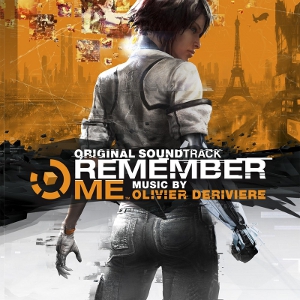Remember Me Original Soundtrack
 |
Album Title: Remember Me Original Soundtrack |
| Record Label: Capcom |
|
| Catalog No.: N/A |
|
| Release Date: June 3, 2013 |
|
| Purchase: Download at iTunes |
Overview
Though I can’t say the same of the video game, I was floored by the soundtrack to 2008’s Alone in the Dark. Composer Olivier Deriviere took the melodic template of a blockbuster thriller and spun it in a completely different direction with spellbinding choral work and captivating orchestral fervor. Like Alone in the Dark, 2013’s Remember Me is also an action-adventure video game with stellar music, but that’s where similarities between the two end. As a wonderful corollary to the 2084 Neo-Paris setting of Remember Me, Deriviere’s accompanying score is a vivid avant-garde journey through sounds both classical and contemporary.
Body
Remember Me’s sonic template originates from starkly different directions: realism and fabrication. On one hand, its lush modern melodicism is reminiscent of the colorful awe of RPG soundtracks like Hitoshi Sakimoto’s Final Fantasy XII. But instantly evident is the digital treatment that Deriviere has given to the richly organic orchestra: heavy, dense processing with electronic effects like bursts of static, pulsating and sometimes techno percussion, syncopated start-and-stop flourishes, and bizarre wavering melodies akin to that of a theremin. First track “Nilin the Memory Hunter” encapsulates many of these elements, giving an effective introduction to the rest of the album and preparing the listener for music that’s impossible to ignore.
The award-nominated “Chase Through Montmartre” provides one of the pinnacles of the score, as it twists the main theme in electronic directions before orchestral strings wind up to a maelstrom of techno percussion and a burgeoning breakneck pace. The performance from the Philharmonia Orchestra is flawless, while the electronic elements are produced with cutting-edge technology and wonderfully-integrated.
“Neo Paris” and “The Enforcers” continue a quickening pace, the former beginning as a wholly symphonic piece before incorporating an electronic skipping effect that at first sounds out of place, while the latter enters The Matrix and TRON: Legacy territory given a modern and classy spin by overprocessing and explosions of guitar and industrial influence. The hugely intense collection of sound on “The Fight” also displays Deriviere’s talent on full throttle here, as what begins as a symphonic chase sequence accentuated by fluttering electronic beats and fade-in/fade-out effects flips over into processed female choral vocals, all of which at first seems obtuse and oppressive but later channels Deriviere’s unique and underlying vision for Remember Me’s foreign reality.
Among the softer additions to the soundtrack, “Rise to the Light” provides an atmospheric introduction to Remember Me‘s world, beginning with an initially soft melody and soon joined by a flood of strings and a full complement of strings and horns against a beautifully-toned synth backdrop. “Still Human” starts with a deeply melancholic horn melody trading off with a solo trumpet, before the track evolves to include a tear-jerking string lead and further develops to a roiling, plodding tune with electronically-treated sound. After proud string/woodwind and theremin-styled melodies meld with heavy electronic bleeps and pulses in “Memory Reconstruction,” “Our Parents” also retracts the alien feeling temporarily, as its lack of instrumental and electronic saturation thrusts forth its simplicity, elegance, and mournful emotion.
Further emphasising the game’s theme of ‘dream reconstruction’, “Fragments” showcases female choral vocals as the word “memory” is repeated in various forms, before being met with ballooning feedback, static, and electronic ambience. “Memorize” is more resolved, building from its innocent foundations into a nominal coalescence of strings, horns, and techno/electro foundation. The Ego Room” immediately induces dizziness with its searing pace. Yet it’s not without a sense of wonder, as childlike choral vocals battle with constant electronic effects, punishing in issuance yet soothing in receipt.
Moving to the conclusion of the score, ““Remember Your Childhood” seems to illustrate all the foci of the score, none less effective than the others: symphonic development, electronic beats, warbling melody, and shining beauty. The next track, “The Zorn,” sheds the beauty aspect for a time in favor of a harsh confrontation of oppressive horns adapted with feedback and noise. Finally, “Hope” unfurls a sad and dreamy melody whose electronic flourishes help translate to triumph and hope, a perfect capstone to this futuristic yet grounded work of awe and wonder.
Summary
Olivier Deriviere has really outdone himself with Remember Me. Even the orchestral foundation of the soundtrack would be stellar as an independent work, but Deriviere’s electronic treatment therein, while adding a reeling and bewildering quality, make this a modern, exciting, and powerful album. In addition to adding gravitas to the game’s mind-boggling storyline, the score shines on its own, made all the more effective and rich by the constant battle of symphonic fluidity and digital dynamics. Wonderful and highly recommended. The digital album can be purchased from Capcom for 10 USD now.
Do you agree with the review and score? Let us know in the comments below!
4.5
Posted on April 9, 2014 by Christian Loescher. Last modified on April 10, 2014.














